Impact of Data-driven Innovation in Clinical Pharma
The critical significance that machine learning and big data play in speeding up drug development and discovery will be discussed in this article. We will examine opportunities that lie in shared clinical research pain points and what are the impacts of data-driven innovation in clinical pharma.
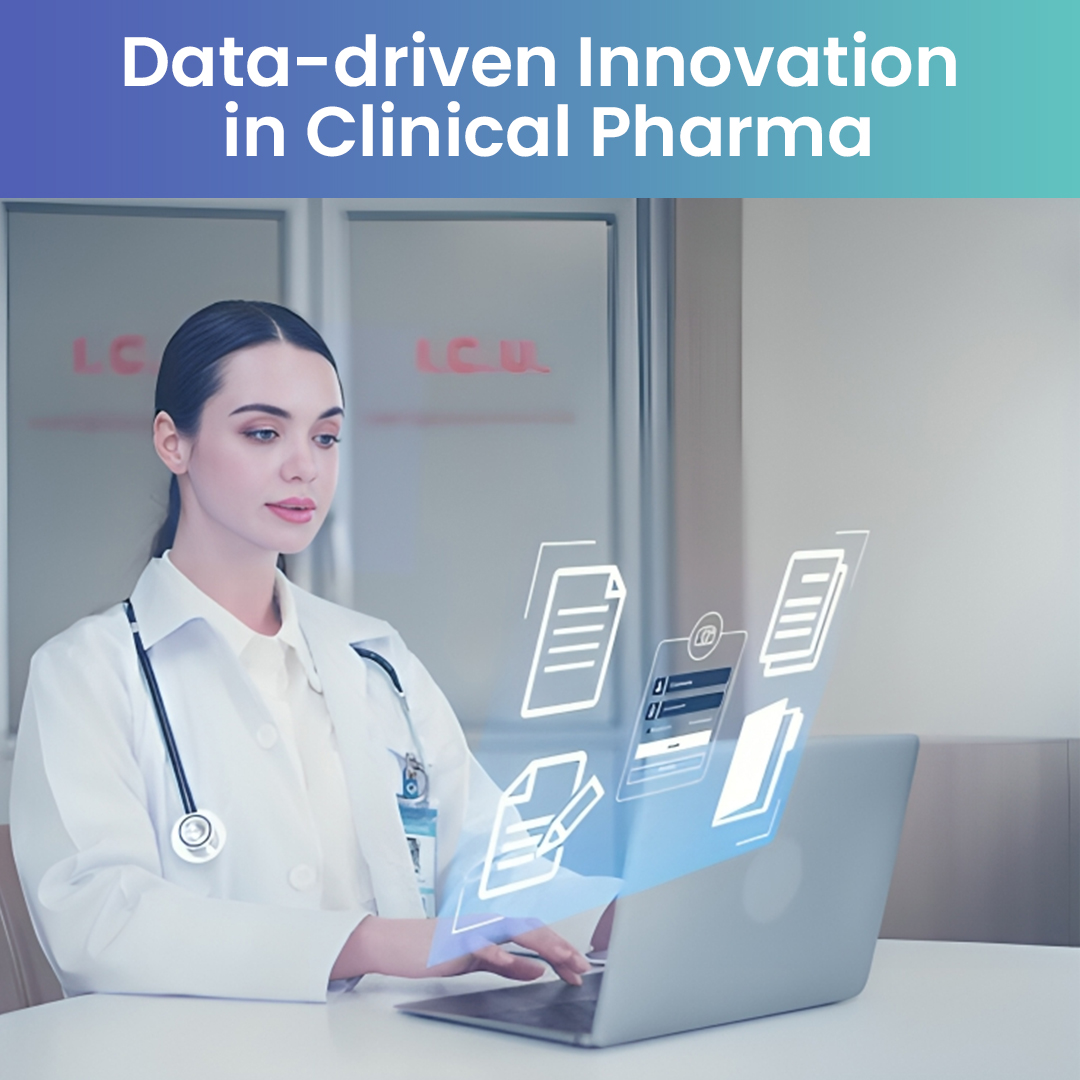
Managing Trial Complexities? Simplify Processes with Our Intelligent Clinical Decision Support Solutions

“Predictive modeling of biological processes and drugs has become significantly more sophisticated and widespread. By leveraging the diversity of available molecular and clinical data, predictive modeling could help identify new potential-candidate molecules with a high probability of being successfully developed into drugs that act on biological targets safely and effectively.”- Mckinsey
The Revolutionary Potential of RWD & AI
The ability of these enormous real-world datasets to demonstrate clinical efficacy and drug safety has only recently emerged, despite RWD’s value in medical product development applications such as trial design and patient population identification. Researchers can now sift through massive patient data sets to forecast future outcomes and provide real-world evidence because of techniques like natural language processing and machine learning. AI-generated RWE can offer more comprehensive and applicable indicators of therapy efficacy if it is shown to be clinically valid. This is because RWD can represent a much bigger patient class than a standard clinical trial by utilizing data from wearable technology, electronic health records, and other sources.
When RWD and AI are used in early studies to assess the clinical importance of medications in development, completely new and extensive benefits are gained. In identifying successful treatment choices, according to research, an RWD-driven AI model was just as effective as a randomized clinical trial. The results can represent one of the biggest changes in the field of medication development in many years. Without ever worrying about bringing up safety or efficacy issues, RWE might enable the testing of many medication candidates before using human subjects.
Opportunities Lie in Shared Clinical Research Pain Points
A clinical study takes a lot of effort to conduct. Regardless of the study in issue, stakeholders face many of the same challenging obstacles.
- Decision Overwhelm: A trial’s outcome is influenced by key strategic choices, such as the locations of trial sites, patient recruitment and enrollment strategies, and protocol requirements. Then there are the daily choices that must be taken to conduct a study efficiently and by trial procedures up to 3 million.
- Protocol Adherence: Clinical trial procedures assist in ensuring a trial’s validity, safety, and ethical behavior while directing the entire research process. Even if they have several operational implications and are frequently very scientific, the individuals carrying out their execution may not be scientists. Therefore, interpreting a protocol can be difficult.
- Patient Recruitment: Individuals are not signing up for trials because they are unaware of them or because they or their doctors are worried about their safety or intent. The same is true for clinical trials, which frequently lack racial, ethnic, and gender diversity due to recruiters’ ignorance of the best strategies for reaching historically underrepresented groups.
Slow Drug Development Pipeline? Accelerate Processes With AI-Powered Clinical Decision Support Solutions
Impact of Data-driven Innovation in Clinical Pharma
Data-driven innovation is transforming clinical pharma, enhancing precision, efficiency, and outcomes in drug development. By leveraging advanced analytics, AI, and real-world data, the industry is accelerating breakthroughs. In this section, we present 8 key points highlighting its revolutionary impact and future potential.
 1. Lead Optimization & Drug Design
1. Lead Optimization & Drug Design
Data science revolutionizes the way molecules are developed for medicinal applications by speeding up lead optimization and drug design processes. The most promising compounds for additional research can be chosen by using molecular modeling approaches to forecast the binding affinity and pharmacokinetic characteristics of possible therapeutic candidates.
- The creation of Pfizer’s oral antiviral medication for COVID-19, Paxlovid, which was created utilizing structure-based drug design techniques, is a perfect illustration. Using high-resolution protein structures from X-ray crystallography, scientists were able to create tiny compounds that effectively block the SARS-CoV-2 major protease, a crucial enzyme for viral replication.
By anticipating how these compounds will interact with other biological components, such as transporters and metabolic enzymes, clinical decision support system software solutions can further optimize these substances and lower the likelihood of negative drug reactions. To maximize the binding affinity and specificity of bispecific antibodies, machine learning algorithms can forecast the best linker chemistry and target selection for ADC. New drug candidates with enhanced potency, selectivity, and metabolic stability can be designed using quantitative structure-activity relationship models, which link a molecule’s chemical structure to its biological action.
2. Clinical Trial Design & Optimization
Clinical trial design and analysis are optimized using data science. To find appropriate patient populations, machine learning algorithms or AI healthcare mobile app development services can examine enormous volumes of real-world and historical clinical trial data. In the end, this can speed up the development and accessibility of novel treatments by resulting in more cost-effective trials with smaller sample numbers.
Data science enables adaptive trial designs, which optimize trial efficiency and increase the probability of success by allowing protocol alterations based on interim assessments. Additionally, real-time analysis of clinical trial data by machine learning algorithms might spot safety warnings or efficacy trends early on. This can increase the likelihood of a good outcome by allowing researchers to promptly alter the study design, such as changing the dosage or including a new treatment arm. AI in clinical pharma can forecast patient dropout rates, enabling focused interventions to increase patient retention and reduce missing data.
3. Streamlining Drug Development
Data science is turning out to be a powerful tool for cutting costs in the pharmaceutical industry. Researchers can find bottlenecks in drug development by utilizing machine learning and predictive modeling, which can result in significant cost reductions. By predicting the pharmacokinetic and pharmacodynamic characteristics of drug candidates, for instance, in silico modeling and simulation can lessen the need for costly and time-consuming animal research.
Additionally, data-driven methods can enhance the design of clinical trials, resulting in lower total expenditures and smaller sample sizes. This helped patients by speeding up access to potentially life-saving treatments.
4. Accelerating Drug Discovery
Conventional drug discovery is an extremely expensive and time-consuming procedure. A new drug’s journey from the lab bench to the patient’s bedside frequently takes years, if not decades. AI in drug discovery, however, is altering this environment:
- Rapid Target Identification: Large biological datasets can be swiftly analyzed by data analytics and ML/AI algorithms to find possible therapeutic targets. Early phases of drug discovery are accelerated as a result.
- Repurposing Existing Drugs: By avoiding many of the early stages of drug development, data-driven methods can find novel therapeutic applications for already-approved medications.
- Efficient Lead Optimization: By using computational models to forecast the safety and biological activity of thousands of compounds, scientists can save time and money by concentrating on the most promising candidates.
- Predictive Toxicology: Potential toxicities can be predicted by machine learning models, which lowers the possibility of expensive late-stage failures.
AI in clinical pharma gives patients who desperately need new medicines hope by drastically reducing the time it takes to find new drugs, especially when it comes to rare genetic disorders or newly developing infectious diseases.
5. Early Disease Detection & Treatment Response Prediction
Early disease detection with artificial intelligence and data analytics enables more effective treatments and even prevention. By predicting a person’s reaction to a certain treatment, predictive models can help guide treatment decisions for improved results.
By making medicine more accurate, efficient, and patient-focused, precision medicine can fully transform patient care.
6. Drug Repurposing
Repurposing drugs is the quickest option to introduce treatments to the market. Anything can be made discoverable through the analysis of billions of data points concealed in enormous life sciences data ocean archives and the mapping of all the connections through research graphs. Pharma can most effectively use the data-driven strategy in this situation.
More pertinent data can be produced in real-time by employing life sciences domain ontologies (as opposed to merely subdomain ontologies, such as gene ontologies) with AI software development services or technologies like network analysis and machine learning. With little experimentation or testing, this data will aid in the repurposing of medications.
7. Molecular Property Prediction
AI models have a high degree of accuracy in predicting molecular attributes, which is essential for finding possible therapeutic candidates. Methods such as:
- Based on chemical structure, algorithms such as Random Forests and Support Vector Machines are frequently employed to forecast biological activity.
- Convolutional neural networks (CNNs), for instance, are used to forecast characteristics like toxicity and solubility and to assess complex molecular data.
Large datasets, including past data on medication safety and efficacy, are used to train these models, improving prediction accuracy, and cutting down on the time and expense of experimental testing.
8. Reducing Costs & Risks
Data-driven innovation is revolutionizing cost management and risk mitigation in clinical pharma. Advanced analytics and machine learning algorithms enable precise patient stratification, optimizing trial designs and reducing recruitment costs.
- Real-time monitoring of clinical data identifies anomalies early, minimizing trial failures and associated financial losses.
- Predictive models anticipate adverse events, enhancing patient safety while ensuring regulatory compliance.
- Furthermore, leveraging synthetic control arms and virtual trials decreases the reliance on extensive traditional control groups, cutting expenses without compromising data integrity.
- Integrating historical data and real-world evidence further refines decision-making, reducing redundancy in drug development pipelines.
These innovations streamline processes, mitigate risks, and unlock significant cost savings, enabling pharmaceutical companies to allocate resources efficiently while maintaining rigorous quality standards and accelerating the path to market.
Need Improved Patient Outcomes? Leverage Advanced Analytics for Effective Decision-Making and Enhanced Care Delivery
Digital Twins and AI Models: Future Vision of Clinical Pharma
Artificial intelligence and digital technologies, such as organ-on-a-chip and digital twins, function as virtual representations of patients’ physiological traits. This virtual clinical trial model aids in obtaining priceless information regarding patient health, medication side effects, and the effects of unsuccessful treatments. To take a proactive approach to drug research, several pharmaceutical companies currently use digital technology to assess post-market drug surveillance and forecast illness progression.
In the future of clinical pharma, trials will be integrated with AI-powered gadgets like smart wearable sensors to gather real-time patient health data. During clinical trial periods, effective and continuous data monitoring is made possible by incorporating AI technologies. Additionally, it lessened the workload of gathering patients at trial locations using individualized patient monitoring devices.
For simple prediction, the system automatically gathers data from many sources and passes it to clinical trial platforms. Furthermore, wearable technology makes it possible to automatically gather and handle data with dropout for specific patients, which reduces the risk and improves the efficiency of clinical studies.
Implications for CTOs and CIOs in Pharma
Since the ability to manage and evaluate vast amounts of data is crucial, the evolving data practices present both opportunities and challenges for CTOs and CIOs. To promote innovation and ensure data security and compliance, they must negotiate the challenges of incorporating modern technologies into pre-existing infrastructures. In addition, maintaining operational effectiveness while developing technology skills appears to be a major problem in 2024.
Furthermore, as precision medicine gains traction, CTOs, and CIOs must concentrate on creating systems that can manage complex and individualized patient data. As a result, the move to individualized care necessitates reliable data management systems that can securely and effectively handle large datasets.
The Future of AI in Drug Development
In clinical pharma, trials are undergoing momentous change and have reached a turning point in the convergence of data that drives AI and the opportunities and difficulties it provides. The entire clinical trial process could be disrupted by AI. Artificial intelligence is accelerating asset and trial ROI optimization as well as drug discovery. We just need a small portion of the experimental evidence that is often needed because it can accurately anticipate the effects of medicinal substances.
Drug developers must collaborate with an experienced clinical decision support system software solutions company like NextGen Invent. We are adept at navigating the complexities of emerging technologies and offer the knowledge and comprehensive strategy required to optimize the advantages of these game-changing instruments. Our all-encompassing strategy or services ensure the best use of technology and tactics by combining several facets of drug development, including clinical development, post-approval operations, and market access. Better research efficiency, quicker approvals, therapeutic access, and eventually less time to give patients the proper medication are the results of this.
Conclusion
Artificial intelligence will play a significant role in clinical pharma in the future given the developments mentioned above. AI based software development services will provide a real-time analysis technique that will speed up the discovery of novel medications. Additionally, the use of AI speeds up the drug-creation process, which incentivizes pharmaceutical corporations to devote more time to more precise research and development procedures. Pharmaceutical companies can benefit from AI, but integrating tech-based products requires overcoming several obstacles.
The future of clinical research will be shaped by the broad use of digital technologies, virtual learning resources, and AI healthcare mobile app development services. Pharmaceutical businesses will have less financial strain on drug development due to technology integration. To bridge the gap between medication research, development, clinical trials, approval, and market supply, pharmaceutical companies will be concentrating on leveraging AI applications to create patient-centric drugs with seamless accuracy in the future.
Frequently Asked Questions About Data-driven Innovation in Clinical Pharma
Related Blogs
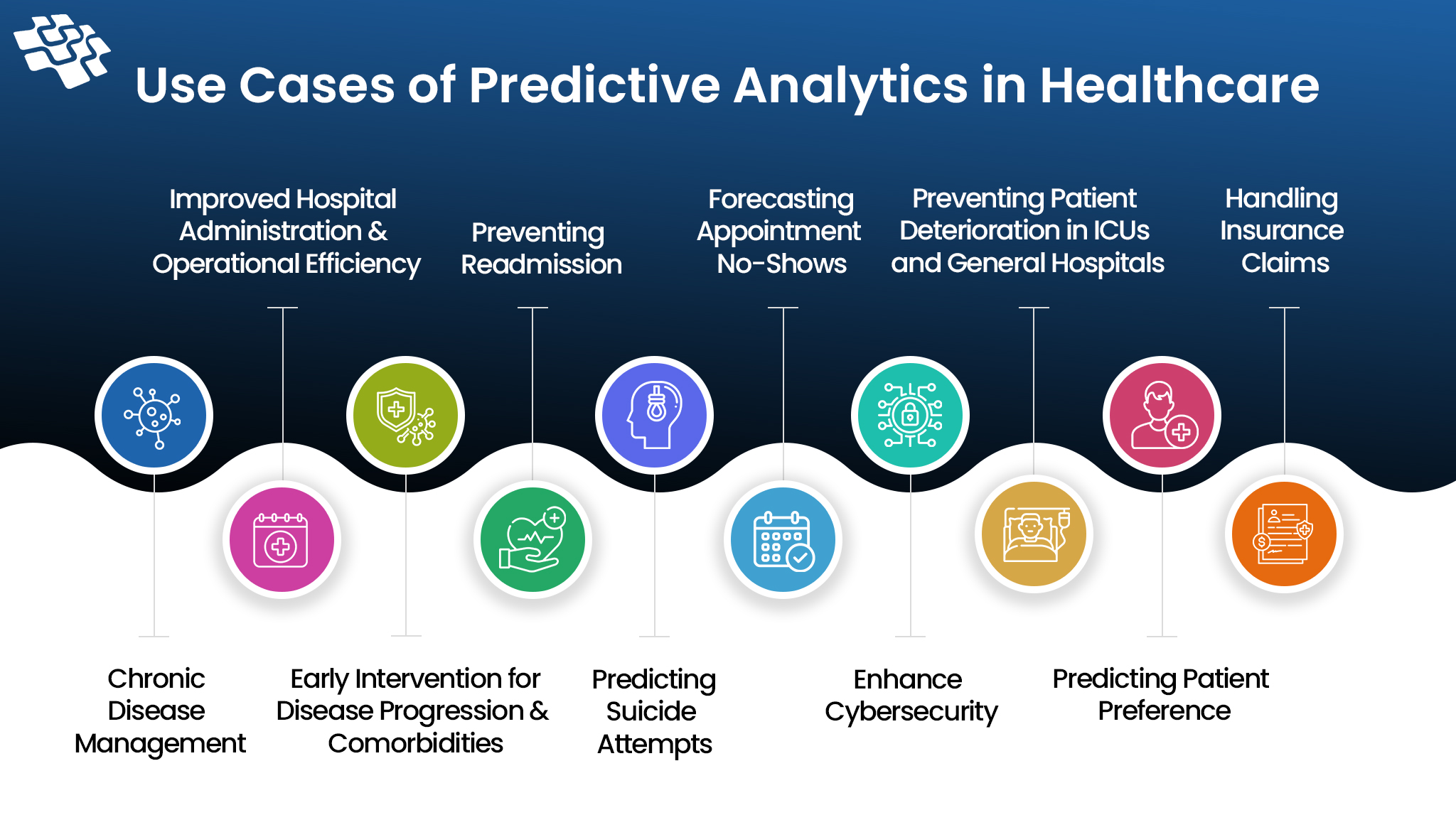
How is Predictive Analytics in Healthcare Revolutionizing It
Imagine if medical professionals could foresee your health problems before they become critical. Predictive analytics in healthcare is real and not just science fiction.
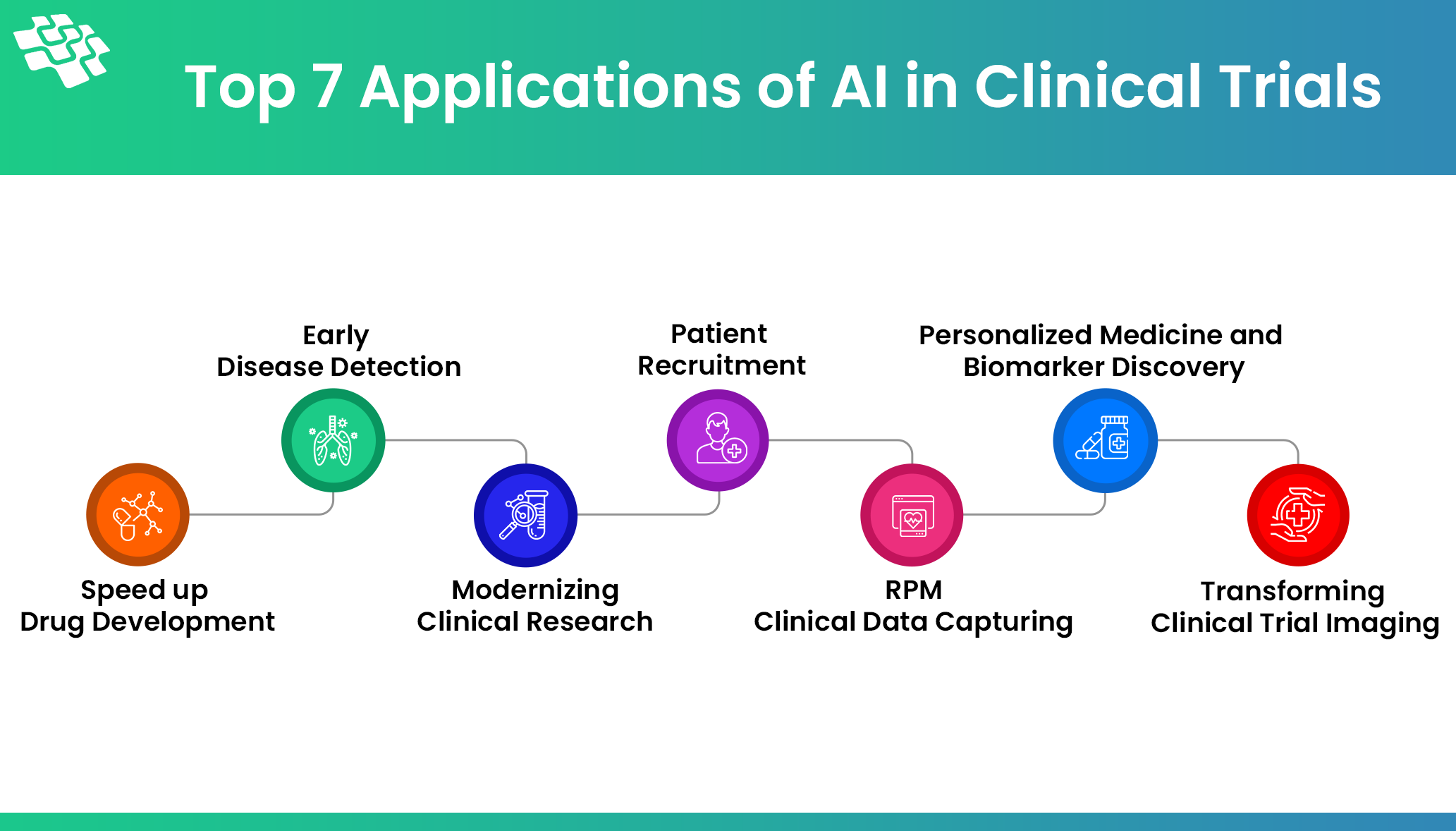
How AI in Clinical Trials is Improving Patient Outcomes
The past year has seen a lot of coverage of AI because of its potential applications in business, logistics, technology, healthcare, and other fields. What about clinical research, though?
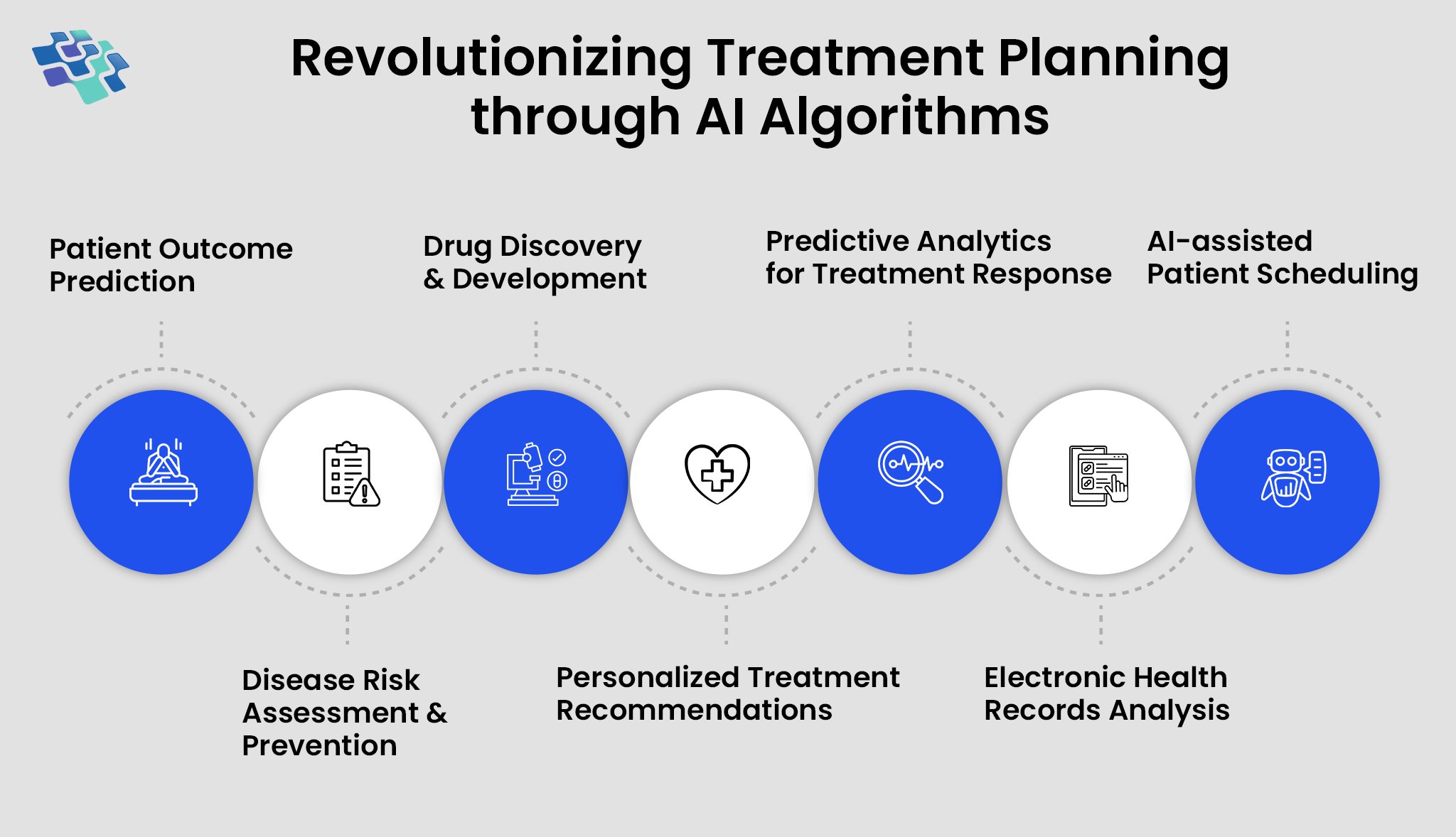
The Role of AI in Personalized Healthcare
The World Economic Forum projects that by 2030, AI in personalized healthcare will be valued at $188 billion worldwide. Due to the increased healthcare needs of the aging population...
Stay In the Know
Get Latest updates and industry insights every month.
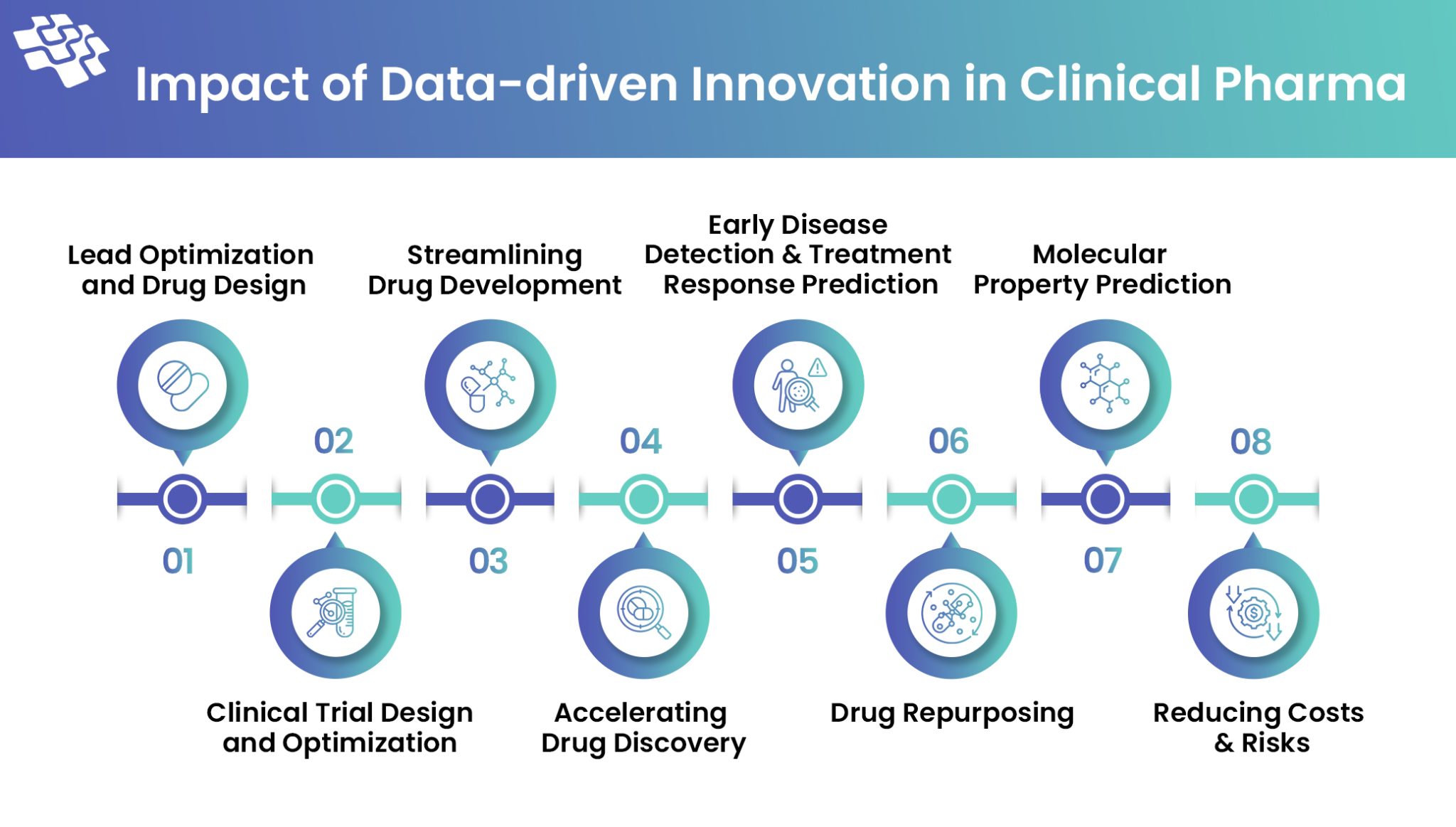 1. Lead Optimization & Drug Design
1. Lead Optimization & Drug Design